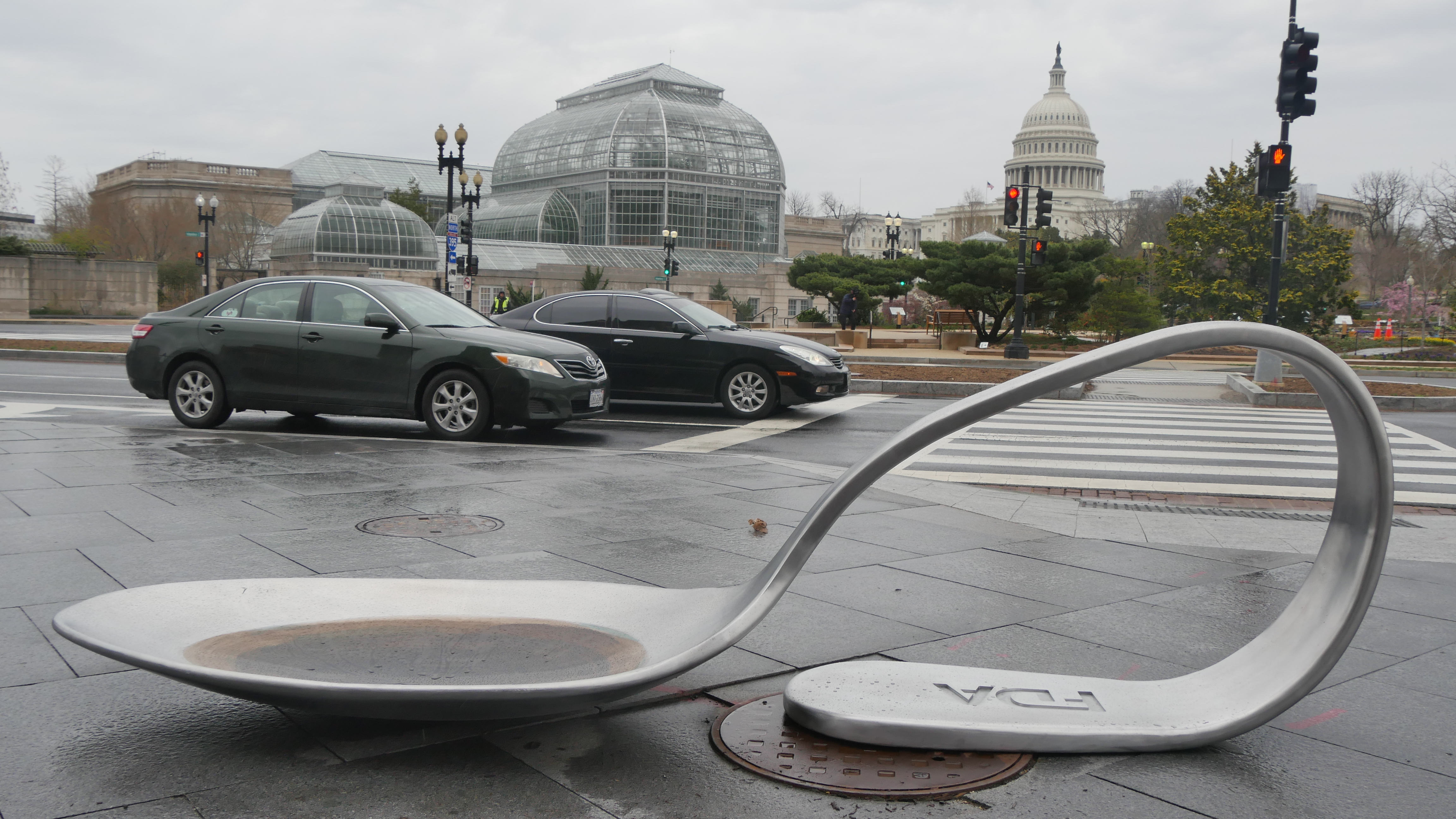Domenic Esposito: FDA Spoon
October 10 – October 25, 2019
George Sherman Union Plaza (775 Commonwealth Avenue, Boston)
Artist and activist Domenic Esposito brings his sculpture FDA Spoon to the Boston University Charles River Campus as part of the artist’s ongoing activism to inform and educate the public about the unfolding tragedy of the opioid epidemic and the deadly and destructive effects it has had on people from all walks of life.
FDA Spoon (one of four spoons) was originally created in 2019 by Esposito as a protest intended to bring awareness to the opioid epidemic and spur accountability among doctors and pharmaceutical companies who manufacture and prescribe the drug. Since first installing the initial spoon (Purdue Spoon) in June 2018 in front of Purdue Pharma in Stamford, CT, he has produced new editions of the sculpture. The FDA Spoon, on view on Boston University’s George Sherman Union Plaza, was first placed in front of the headquarters of the Food and Drug Administration in Washington, DC, as part of a larger protest in April 2019 against what opioid activists perceive to be government inaction.
In May of this year Esposito began the HONOR tour with a specially created spoon sculpture to commemorate those who have lost their lives to the opioid addiction battle. At each location individuals were invited to sign the spoon in order to honor the memory of loved ones.
This will be the sculpture’s first installation on a university campus. The Opioid Spoon Project at Boston University was initiated by Gregory Williams, Associate Professor, Department of History of Art & Architecture, to coincide with his Fall History of Art & Architecture course, “Contemporary Art, Politics, and Activism.”
The installation of FDA Spoon continues Boston University’s interdisciplinary response to the opioid crisis. In the Fall of 2018 the BU Center for the Humanities co-hosted a symposium, Humanities Approaches to the Opioid Crisis, with the BU School of Public Health. You can find more information and videos from that forum here.
In exhibiting FDA Spoon, the BU Art Galleries, the Department of History of Art & Architecture and the BU Arts Initiative recognize the work of Esposito as operating at the intersection of art and social change. There will be an opening reception on October 10th with the artist, and a closing panel discussion on October 24th on art and activism with Esposito and other artist activists.
Domenic Esposito is an artist and activist living in the Boston area. Running as an undercurrent to his sculpture is Esposito’s passion for architecture. Later works are increasingly emotional and wrought with social messages and cues that demonstrate an artist coming into his own. Most recently the artist embarked on an ambitious, personal and controversial project with the “Purdue Spoon”. Esposito has attended metalworking and design classes at Massachusetts College of Art and Design, Stonybrook Fine Arts, Artist Asylum and Prospect Hill Forge. He currently works and resides in Westwood, MA. For more information: https://domenicesposito.com
Public Programs:
Opening Reception – Friday, October 10th, 6pm, George Sherman Union Plaza
Closing Panel Discussion: Art, Activism, and Public Awareness of the Opioid Crisis
Thursday, October 24, 2019, 6-7:30pm. Reception to follow. Free and open to the public. Please RSVP
Photonics Building, 8 St. Mary’s Street
9th floor, Colloquium Room
To mark the conclusion of the temporary installation of Domenic Esposito’s FDA Spoon sculpture on the Boston University campus, we will hold a panel discussion on art’s role in supporting activism directed toward the opioid crisis. Esposito will be joined by artist-activists Adam DelMarcelle and Nancy Marks for a conversation moderated by art historian Gregory Williams. Among other topics, the panel will explore how artists balance their studio practice with their activism, how such activist work builds audiences, and how artist-activists negotiate with a wide range of institutions.
Adam DelMarcelle is an artist whose work focuses on design activism and the role of the graphic witness to expose and document societal injustice. He garnered national attention with his project “What Heroin Sounds Like”, which allowed him to travel widely to spread awareness of the opioid crisis and its destructive impact on our communities. DelMarcelle is an adjunct professor at York College of Pennsylvania, Lebanon Valley College, Pennsylvania College of Art and Design and Kutztown University teaching courses in graphic design, printmaking and Visual Communication. He holds a BFA from Pennsylvania College of Art and Design and an MFA from Vermont College of Fine Arts. His work is in the permanent collections of The Cushing Witney Medical Library at Yale University as well as the Library of Congress in Washington DC.
Nancy Marks is a public health activist, art teacher and visual artist with an extensive background in painting, printmaking and paper making. In 2014, she launched The Intimacy of Memory, an initiative exploring grief and loss through art. The Opioid Project is an interactive art and storytelling project co-founded and facilitated by Marks and physician and Health Story Collaborative founder Annie Brewster, is her way of weaving the strands of art, healing, love and moral calling.
Crisis & Recovery Resources:
BU Collegiate Recovery Program – A community of BU students in recovery from substance use
BU Behavioral Medicine – Counseling and mental health resources for BU students
Massachusetts responds to the opioid epidemic
City of Boston Recovery Services
The Opioid Spoon Project at Boston University is co-sponsored by the Boston University Art Galleries, the BU Arts Initiative, and the Department of History of Art & Architecture.
Image Credit: Courtesy Domenic Esposito
